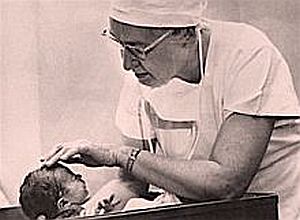The vitality of preterm infants should be assessed with an Apgar score, a tool used to measure the health of newborns immediately after birth. That is the conclusion by researchers at Karolinska Institutet in Sweden who in a large observational study examined the value of Apgar scores for preterm infants.
The so-called Apgar score has been used since the 1950s to quickly assess the vitality of the infant soon after birth. Doctors and midwifes measure five parameters in the infant – heart activity, respiration, muscle tone, irritability and colour – and give each parameter a score from 0-2. The total score can thus range from 0 to 10, where a higher number indicates better health and a greater chance of survival.
However, some have questioned the value of the Apgar score in preterm infants, since the immaturity of these infants may lead to lower scores compared with infants born at term.
Therefore, the researchers in this study wanted to find out if the Apgar score could be used to predict the mortality risk of preterm infants during the first four weeks of life (the neonatal period).
Using Swedish nationwide register data, the researchers studied 113,000 non-malformed infants born after 22 to 36 weeks of pregnancy in the years 1992-2016. The risk of neonatal mortality was calculated for Apgar scores at five and ten minutes after birth, and separate analyses were performed for infants born at 22-24, 25-27, 28-31, 32-34 and 35-36 gestational weeks.
A total of 1,986 (1.8%) preterm infants died in the neonatal period. As expected, the neonatal death rate sharply increased with shorter pregnancy length, from 0.2% for infants born at 36 weeks to 76.5% for those born at 22 weeks.
Regardless of pregnancy length, the risk of neonatal death increased with a lower Apgar score. For children born very prematurely, a lower Apgar score significantly increased the absolute risk of neonatal mortality. Even a slight increase in Apgar score from five to ten minutes after birth was associated with a lower risk of neonatal death.
“Our results show the importance of registering Apgar score also in preterm infants,” says Sven Cnattingius, senior professor at the department of medicine, Solna, Karolinska Institutet, and the study’s corresponding author. “It is important that infants with reduced scores receive full clinical attention regardless of gestational age.”
“Heart activity and breathing are the cornerstones of the Apgar assessment,” says co-author Stefan Johansson, associate professor at the department of medicine, Solna, Karolinska Institutet and neonatologist at the Sachsska children and youth hospital in Stockholm. “Our research indicates that the chance of survival increases the better you are at stabilising the premature baby’s circulation and breathing immediately after birth.”
The researchers considered several confounding factors that could impact the outcome, including the mother’s age, smoking, weight, blood-pressure, infant’s mode of delivery and year of birth. The researchers note that the study is based on Swedish conditions and that the results may be different in other countries.
“Although it is frustrating that we usually cannot pinpoint the causes of a reduced Apgar score, we need to embrace that the score is, independent of gestational age, the best available tool we have to evaluate the newborn’s health in the delivery room,” says Neda Razaz, assistant professor in the same department.
Around 115,000 non-malformed children are born in Sweden annually, and slightly more than 5 percent are born preterm. Of these, around 150 children die during the neonatal period, of which around 100 are born preterm.
The study was funded by grants from the Swedish Research Council for Health, Working Life and Welfare and by Karolinska Institutet’s distinguished professor award to Sven Cnattingius.
Abstract
Background: Gestational age is the major determinant of neonatal death (death within the first 28 days of life) in preterm infants. The joint effect of gestational age and Apgar score on the risk of neonatal death is unknown.
Methods: Using data from the Swedish Medical Birth Register, we identified 113,300 preterm infants (22 weeks 0 days to 36 weeks 6 days of gestation) born from 1992 through 2016. In analyses stratified according to gestational age (22 to 24 weeks, 25 to 27 weeks, 28 to 31 weeks, 32 to 34 weeks, and 35 or 36 weeks), we estimated adjusted relative risks of neonatal death and absolute rate differences in neonatal mortality (i.e., the excess number of neonatal deaths per 100 births) according to the Apgar scores at 5 and 10 minutes and according to the change in the Apgar score between 5 minutes and 10 minutes. Scores range from 0 to 10, with higher scores indicating a better physical condition of the newborn.
Results: There were 1986 neonatal deaths (1.8%). The incidence of neonatal death ranged from 0.2% (at 36 weeks of gestation) to 76.5% (at 22 weeks of gestation). Lower Apgar scores were associated with higher relative risks of neonatal death and greater absolute rate differences in neonatal mortality in all gestational-age strata. For example, among infants born at 28 to 31 weeks, the adjusted absolute rate differences according to the 5-minute Apgar score, with those who had a score of 9 or 10 serving as the reference group, were 51.7 (95% confidence interval [CI], 38.1 to 65.4) for a score of 0 or 1, 25.5 (95% CI, 18.3 to 32.8) for a score of 2 or 3, 7.1 (95% CI, 5.1 to 9.1) for a score of 4 to 6, and 1.2 (95% CI, 0.5 to 1.9) for a score of 7 or 8. An increase in the Apgar score between 5 minutes and 10 minutes was associated with lower neonatal mortality than a stable Apgar score.
Conclusions: In this study, Apgar scores at 5 and 10 minutes provided prognostic information about neonatal survival among preterm infants across gestational-age strata. (Funded by the Swedish Research Council for Health, Working Life, and Welfare and Karolinska Institutet.)
Authors
Sven Cnattingius, Stefan Johansson, Neda Razaz
[link url="https://news.ki.se/apgar-score-effective-in-assessing-health-of-preterm-infants?_ga=2.128293578.737703907.1593705095-585492334.1578669154"]Karolinska Institutet material[/link]
[link url="https://www.nejm.org/doi/10.1056/NEJMoa1915075"]New England Journal of Medicine abstract[/link]

